|
|
|
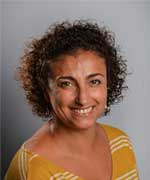 |
Nabila BOUATIA-NAJI
Prof. Nabila Bouatia-Naji is a geneticist and an INSERM research director (Professor grade) at the Paris Cardiovascular research center (PARCC), Université de Paris, France. Dr Bouatia-Naji holds a Ph.D. in human genetics from Lille University, France and has developed expertise in the study of cardiometabolic diseases and traits in human populations. Her current multidisciplinary research team includes statistical geneticists, molecular biologists, and clinicians. The team supported by an ERC grant aims to understand fibromuscular dysplasia and spontaneous coronary artery dissection, two atypical vascular diseases with high prevalence in women. Her project leverages large genetic datasets generated in patients, combined with high throughput functional genomics applied to vascular cell models to understand the origin of these vascular diseases. She is an active advocate for more leadership opportunities for women in health sciences, and generally in STEM.
Le Dr Nabila Bouatia-Naji est généticienne de formation, et actuellement directrice de recherche Inserm (Professeure) au Paris centre de recherche cardiovasculaire (PARCC), Université de Paris, France. Elle a obtenu un doctorat en génétique humaine sur l’obésité et le diabète de type 2 à L’Université de Lille en 2006. Elle a effectué un séjour postdoctoral à l’Université de Cambridge, au Royaume Uni, pour étudier la génétique de traits lié au diabète. L’équipe de recherche Inserm qu’elle dirige actuellement comprend des généticiens statisticiens, des biologistes moléculaires et des cliniciens. Son équipe est actuellement soutenue par une bourse ERC. Elle étudie la base génétique de maladies cardiovasculaires atypiques à forte prévalence chez les femmes en utilisant des méthodes de pointe en génétique statistique et en génomique fonctionnelle. Au cours de sa carrière, elle a reçu des prix prestigieux comme le prix Jeune Checheure en 2016 au cours de la 13ème édition de la confédération intercontinental des sociétés de génétique humaine. Le Dr Bouatia-Naji est engagée pour que les femmes aient davantage d’opportunités de leadership dans les domaines des sciences de la santé et dans le monde académique en général.
|
|
|
|
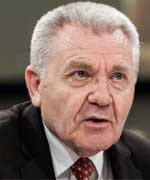
|
Jean-Pierre BOURGUIGNON
Jean-Pierre Bourguignon was President of the European Research Council from January 2014 until December 2019; he currently holds the position ad interim. A mathematician by training, he spent his whole career as a fellow of the Centre National de la Recherche Scientifique from 1969 to 2013. He held a professor position at École Polytechnique from 1986 to 2012. From 1990 to 1992, he was President of the Société Mathématique de France, and President of the European Mathematical Society from 1995 to 1998. He is a former board member of the EuroScience organisation (2002-2006), and has served on EuroScience Open Forum (ESOF) committees from 2004 to 2013. Prior to his mandate as President of the European Research Council, he was the Director of the Institut des Hautes Études Scientifiques from 1994 until 2013. This international research institute located near Paris stands as the European counterpart of the Institute for Advanced Study in Princeton. Jean-Pierre Bourguignon received the Prix Paul Langevin in 1987 and the Prix du Rayonnement Français in Mathematical Sciences and Physics from the Académie des Sciences de Paris in 1997. He was elected a member of Academia Europaea in 1995 and a foreign member of the Royal Spanish Academy of Sciences in 2001. In 2005, he was elected honorary member of the London Mathematical Society. In 2008, he was made Doctor Honoris Causa of Keio University, Japan, and, in 2011, Doctor Honoris Causa of Nankai University, China. In 2017, he was elected honorary member of the German Association of Mathematicians (DMV) and foreign member of the Portuguese Academy of Sciences. In 2018 he was made Doctor Honoris Causa of the University of Edinburgh and, in 2019, honorary member of the Polish Mathematical Society.
|
|
|
|
 |
Abdoulaye DJIMDE
Prof. Parasitology-Mycology
Institution: Malaria Research and Training Center, Faculté de Pharmacie, Université des Science, des Techniques et des Technologies de Bamako.
Domaine de recherche: Abdoulaye Djimde a obtenu un diplôme de Doctorat en Pharmacie de l’Ecole Nationale de Médecine et de Pharmacie, Bamako, Mali, en 1988; un PhD en Microbiologie et Immunologie de l'Université du Maryland, Baltimore, Maryland, Etats-Unis en 2001 et est Professeur Titulaire en Parasitologie-Mycologie. Il est membre de l’Académie Africaine des Sciences et de l’Académie des Sciences du Mali
Recherche menée: Le principal objectif de ses recherches est de comprendre comment le parasite du paludisme devient résistant aux médicaments antipaludiques et comment cette résistance se propage dans le temps et l'espace. Avec son équipe et ses collaborateurs nationaux et internationaux, il mène des travaux de terrain et en laboratoire sur la base génétique des phénotypes observés chez l’homme, le parasite et le vecteur.
Liste des publications: https://www.ncbi.nlm.nih.gov/pubmed/?term=Djimde+a.%2C
|
|
|
|
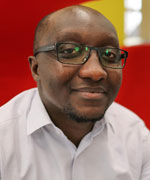 |
Tegawendé F. BISSYANDÉ
Prof. Dr. Tegawendé F. Bissyandé is a Senior Research Scientist with the SnT Interdisciplinary Centre for Security, Reliability and Trust of the University of Luxembourg. He received his PhD in Computer Science from the University of Bordeaux (France) in 2013 after earning an engineering degree in Telecommunication in 2009 from ENSEIRB. As an academic from the African diaspora, Prof. Bissyandé is also contributing with lectures at several universities in West Africa, including Université Joseph Ki-Zerbo (Burkina Faso), Université Cheick Anta Diop (Senegal), Université Virtuelle du Burkina Faso and ENSSTA (Tchad). Prof. Bissyandé’s research interests span across several topics, including mainly: (1) program repair, i.e., finding and fixing bugs and vulnerabilities in software; (2) software security, i.e., mobile static security analysis, and machine learning based malware detection; (3) software analytics, i.e., code search, clone detection and repository mining. His research is funded through several research grants as well as by prominent industry partners. He has published over 70 research papers in computer science and related topics in top-tier venues, including ACM/IEEE ICSE, IEEE/ACM ASE, IEEE ESEC/FSE, IEEE TSE, IEEE TIFS, EMSE, KDD, etc. He has also served his research community as Program Committee member of several conferences, including ASE, ISSTA, ICSME, ICSE. Prof. Bissyandé also contributes with his expertise as a consultant for ICT for development initiatives and projects.
Le professeur Tegawendé F. Bissyandé est directeur de recherche (Senior Research Scientist) au Centre interdisciplinaire pour la sécurité, la fiabilité et la confiance de l'Université du Luxembourg (Interdisciplinary Centre for Security, Reliability and Trust, SnT). Il a obtenu son doctorat en informatique à l'Université de Bordeaux (France) en 2013 après avoir obtenu un diplôme d'ingénieur en télécommunications en 2009 à l'ENSEIRB. En tant qu'universitaire issu de la diaspora africaine, le professeur Bissyandé contribue au développement des compétences par des séminaires et cours dans plusieurs universités d'Afrique de l'Ouest, notamment l'Université Joseph Ki-Zerbo (Burkina Faso), l'Université Cheick Anta Diop (Sénégal), l'Université Virtuelle du Burkina Faso et l'ENSSTA (Tchad).
Les intérêts de recherche du professeur Bissyandé s'étendent sur plusieurs sujets, utilisant notamment des techniques d’Intelligence Artificielle pour implémenter des analyses automatique pour la fiabilité et la sécurité des logiciels.
Ses principaux résultats portent principalement sur (1) la réparation automatique des programmes informatique, c'est-à-dire la détection et la correction des bogues et des vulnérabilités des logiciels ; (2) la sécurité des logiciels, c'est-à-dire l'analyse statique de la sécurité des applications pour téléphones mobiles et la détection des logiciels malveillants basée sur l'apprentissage automatique ; (3) l'analyse des dépôts logiciels, c'est-à-dire la recherche de clones et l’extraction de connaissance sur les pratiques de développement. Ses recherches sont financées par plusieurs subventions de recherche ainsi que par des partenaires industriels de premier plan. Il a publié plus de 70 articles de recherche en informatique dans des revues de premier plan, notamment ACM/IEEE ICSE, IEEE/ACM ASE, IEEE ESEC/FSE, IEEE TSE, IEEE TIFS, EMSE, KDD, etc. Il a également servi sa communauté de recherche en tant que membre du comité de programme de plusieurs conférences prestigieuses, notamment l'ASE, l'ISSTA, l'ICSME, l'ICSE.
Le professeur Bissyandé apporte également son expertise dans des projets de développement en tant que consultant pour les initiatives et les projets de TIC pour le développement.
|
|
|
|
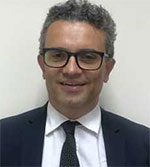 |
Thomas HUYGHEBAERT
Mr. Thomas Huyghebaert is the Head of Policy and Cooperation at the European Union Delegation to the African Union based in Addis Ababa, Ethiopia, where he supports the AU's continental integration and policy processes. He has over 20 years of experience in diplomacy, international/economic relations and development cooperation and has worked on 4 continents mainly with EU Institutions and UN Agencies. Specific competencies that go beyond the management capacities include strategies development, efficient and integrated policy-making processes support, programme and project management, public relations and negotiating skills. He has a strong expertise in development cooperation and multilateral affairs and more specifically in governance, peace and security, migration and economic affairs. Thomas H. obtained an Executive Master in Advanced Management from the HEC School of Management in Paris, a Master’s Degree in European Public Administration and Politic from the College of Europe, and a Master in Political Sciences from the UFSIA (Antwerp) (BA) and the Katholieke Universiteit Leuven (KUL).
|
|
|
|
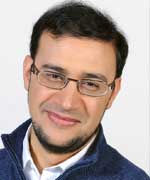 |
Mustapha Laatiaoui
Dr. Mustapha Laatiaoui is a research group leader at the Department of Chemistry at the University of Mainz in Germany. He received his PhD in Physics from the University of Munich in 2010, where he gained expertise in ion manipulation and transport. His research activities include the study of atomic and nuclear structures of the heaviest chemical elements and the investigation of their transport properties. Dr. Laatiaoui has published more than 60 scientific papers in the fields of chemistry, atomic and nuclear physics, many of them with high visibility, such as in PRL and Nature. In 2018 he received an ERC Consolidator Grant for the development of a novel technique of optical spectroscopy to study the electronic structure of elements beyond nobelium.
|
|
|
|
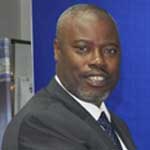 |
Hambani Masheleni
Hambani Masheleni is a holder of a Master of Science in Applied Physics and BSc Honours in Physics. He has a broad range of training and work experience in public sector promoting formulation and implementation policies for science, technology and innovation. Currently he is employed by the African Union Commission and is the A.g. Head of the Division for Science and Technology. Mr. Masheleni has been since involved in the implementation of the African Union STI blueprint STISA-2024, within the overall and broader long term AU Agenda 2063. The objective is to deploy science, technology and innovation across various socio-economic sectors with a view to foster social transformation, economic competitiveness, and creation of long-term economic benefits for the continent and beyond. The AU Commission further continues to take strong measures to maintain Research and Innovation on top of its political, development, and cooperation agendas.
|
|
|
|
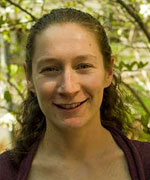 |
Eloise MARAIS
Prof. Dr. Eloise Marais is an Associate Professor in Physical Geography, in the Department of Geography at University College London (UCL) in the UK. She leads a research group focusing on addressing glaring and persistence uncertainties in the chemical composition of the atmosphere, using a range of cutting-edge research tools. She completed a BSc in Chemistry at University of KwaZulu-Natal and an MSc in Chemistry at Rhodes University. In 2007 she acquired a Fulbright Science and Technology award to pursue a PhD at Harvard’s Earth and Planetary Sciences. She is a member of the International GEOS-Chem model Steering Committee and recently was appointed to the Health Effects Institute (HEI) Global Health Oversight Committee. In 2019 Dr Marais received an ERC Starting Grant to fund her project UpTrop.
|
|
|
|
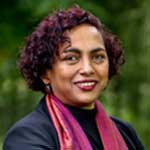 |
Isayvani Naicker
Dr Isayvani Naicker has over 20 years’ management and practical experience in resource mobilisation, strategic international and government to government partnerships, donor support, advocacy and policy consultation, research and policy advice.
Prior to joining African Academy of Sciences, she worked as a Chief Director of International Resources at the Department of Science and Technology South Africa.
She was previously a research associate at the Centre for Science and Policy at the University of Cambridge and a Visiting Research Fellow at the School for Public and Development Management at the University of Witwatersrand. She is a member of international research networks including the Society for the Social Studies of Science, the International Association of Impact Assessment (IAIA), Green Economics Institute at Oxford University, and has engaged professionally with donor agencies (the EC, UNEP, UNDP, OECD, and GEF), African regional partnerships (NEPAD, AU) and networks (African Technology Policy Studies Network) and with senior national policy makers (particularly across Southern African countries).
She holds a PhD in Geography (Science Policy) from the University of Cambridge and MSc (Geology) from the University of Cape Town) and MSc (Philosophy of Social Sciences) from the London School of Economics.
|
|
|
|
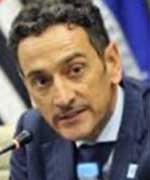 |
Piero VENTURI
Piero is the EU Science Counsellor to the African Union, currently posted in Addis Ababa. Previously he held the same position for Brazil and Latin America.
Piero is an agronomist with PhD in Agricultural Engineering. He has been researching and lecturing at Polytechnic University of Madrid (Spain), Wageningen Agricultural University (the Netherlands) and Alma Mater Studiorum of Bologna (Italy). He has published over 70 international articles. Upon joining the European Commission, he has been project and political officer in agriculture, bioeconomy and international cooperation.
|
|
|
|
 |
Pascale Vielle
Professeure de droit social à l'UCL depuis 1998, de nationalités belge et suisse, Pascale Vielle est licenciée en droit de l'ULB (1988), et docteure en droit de l'institut Universitaire européen de Florence (1997). Elle a travaillé comme chercheuse à l'ULB (1988-1989), à l'Université de Genève (1994-1998) et à l'Institut d'études avancées de Nantes (2018-2019).
A l'UCL (IACCHOS : CIRTES - ESPO : FOPES), elle enseigne dans différents programmes. Ses recherches s'inscrivent dans une perspective multidisciplinaire et adoptent une approche critique sur le droit social comparé, européen et international. Elle s'est notamment consacrée aux thèmes de la protection sociale, de la gouvernance du droit social, de l'égalité des femmes et des hommes et du "droit et genre".
Elle a assumé la première direction de l'Institut fédéral pour l'égalité des femmes et des hommes de 2004 à 2006. Elle a travaillé à la Commission européenne (1989-1990), à l'Organisation internationale du travail (1992-1994) et a été membre du Conseil supérieur de la Justice (2004-2008).
Elle est membre des comités scientifique de la Maison des Sciences de l'Homme Ange Guépin, à Nantes, de l'Institut syndical européen et de la Revue belge de sécurité sociale.
De 2011 à 2019, elle a été membre de panels d'évaluation de l'European Research Council (SH2).
Elle a dispensé un cours de "droit et genre" à l'Université Lumière de Bujumbura de 2009 à 2015.
Depuis 2015, elle s'est engagée dans plusieurs mouvements citoyens en Belgique où son apport consiste à faciliter l'appropriation de contenus scientifiques par la société civile.
Elle est mère de deux enfants.
|
|
|
|
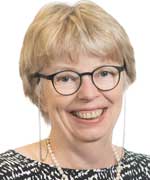 |
Brenda WINGFIELD
Professor Brenda Wingfield – University of Pretoria
Professor Brenda Wingfield has made the study of the global movement and evolution of fungal pathogens, particularly those on trees, her main research focus for the past 30 years.
After obtaining a BSc in biochemistry and genetics from the then University of Natal (now the University of KwaZulu-Natal) and her Honours from the University of Cape Town, she moved to the University of Minnesota where she completed her Master’s in biochemistry, and then to Stellenbosch University for her PhD. She spent time as a Research Assistant for the Institute for Electron Microscopy and then as a Research Officer for UCT’s Department of Biochemistry. After leaving her position of Researcher at Stellenbosch, a position she held for two years, she moved to the University of the Orange Free State (now the University of the Free State) to work as lecturer, Senior Lecturer and eventually Associate Professor, before taking up the position of Professor at the University of Pretoria’s Department of Genetics. She was involved in leading the winning bid for the research team in Tree Health Biotechnology to be one of the first six DST-NRF Centres of Excellence to be established, and was the Programme Leader for the first five years of its existence. She is one of the founding members of the Forestry and Agricultural Biotechnology Institute, and served a 7 year term as Deputy Dean of Research and Postgraduate Studies of the Faculty of Natural and Agricultural Sciences at the University of Pretoria. During this time she was also acting dean for a period. Prof Wingfield holds the DST-NRF SARChI research chair in Fungal Genomics. She is vice president of the Academy of Science of South Africa and the Secretary General of the International Society of Plant Pathology.
Prof. Wingfield has been responsible for a number of major advances in fungal taxonomy and phylogeny, not the least of which was the introduction of DNA-based research tools to her field of research in South Africa. This has enabled her research group to identify the biology of a wide variety of tree pathogens and establish itself as one of the foremost in the study of distribution and population dynamics of tree pathogens using DNA markers. She pioneered fungal genomics at the University of Pretoria where she was responsible for the first fungal genome to be sequenced in Africa. Her success as a researcher is reflected in the internationally recognised work of many of her past PhD students. She has trained 51 Honours students, and supervised 51 Master’s and 51 PhD students and has contributed considerably to bringing more female graduates into the research field.
She has published more than 360 peer-reviewed papers in a variety of international journals including the Fungal Biology, Fungal Genetics and Biology, Mycologia, Molecular Biology and Evolution, Plos Pathogens, and Molecular Ecology. In addition, she has co-authored one book and authored/co-authored 13 book chapters.
Prof. Wingfield’s work and standing as a scientist has garnered considerable recognition. She has won the University of Pretoria’s Excellent Achiever’s Award for 10 consecutive years, and received the University’s Chancellor’s Award for Research in 2012. Additionally, she received the Women in Water Sanitation and Forestry Award twice, the DST Distinguished Women in Science Award, and the African Union Regional Award for Women in Science. She was a recipient of the Harry Oppenheimer Memorial Fellowship Award in 2016 and received the American Phytopathological Society Fellow Award in 2017. She is the only woman to have been awarded the Southern African Society of Plant Pathology Persoon Medal and the South African Society of Microbiology Gold Medal.
|
|
|
|













